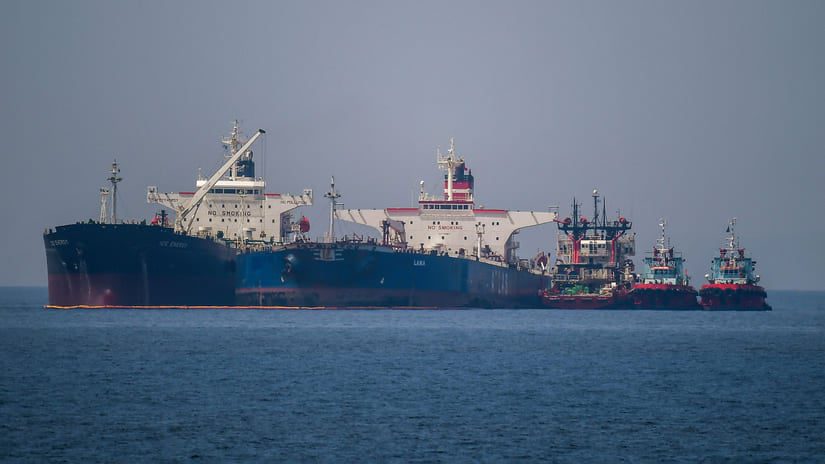The shadow tanker fleet has become the subject of increased attention after Western sanctions on Russian oil, in a context that has seen changes in the shipment flow.
This fleet consists of a large group of tankers that travel across the world’s oceans secretly without drawing attention, in an attempt to avoid sanctions imposed on countries such as Venezuela, Iran, North Korea, and most recently Russia.
The figures revealed, during the month of February 2023, varied greatly about the size of the shadow tanker fleet, starting from about 300 ships to the estimation of the commodity giant “Trafigura” at 600 ships.
However, a detailed investigation – seen by the specialist energy platform – of the scale of this growing phenomenon showed that the shadow tanker fleet had reached 421 ships by February 20.
Shadow carrier fleet size
The report – conducted by the “Splash” platform for maritime news (Splash) – indicated that for unclean tankers – which transport crude oil and fuel oil -, there are 150 Aframex tankers, 49 Suez tankers, and 104 very large tankers.
While clean tankers – which transport refined products – include 5 small “Handy” tankers, 17 “LR1” tankers, 3 “LR2” tankers, and 93 “MR” tankers.
The report finds whether the shadow fleet is large enough to carry Russian exports to its new, remote destinations, noting that Russia now has access to enough oil tankers, but the availability of its clean fleet is barely enough to meet its export targets.
The industry has recorded a frenzied race for the demand of very large oil tankers in the 12 months since Russia invaded Ukraine, with the value of the inventories of many transport companies quadrupling, while the prices of old tankers recorded historical highs, in addition to breaking records in terms of sales volume.
The Clarkson Research Used Tanker Price Index recorded the largest upward movement ever over the past year (2022), rising 52% to the highest level since 2008.
The following graph – prepared by the specialized energy platform – shows Russian oil exports from January 2022 to January 2023:
Implications for using shadow vectors
The growing shadow fleet has led to the aging of the tanker fleet in Russian ports, as confirmed by the report.
For example, in January 2022, 40% of Aframax voyages outside Russia were carried out on vessels less than 10 years old, and only 28% on vessels more than 15 years old, according to data from Botton & Partners. “.
No vessels older than 20 years were used, but by December this age profile had changed significantly.
Only 22% of the Aframax tankers were less than 10 years old, and 50% were over 15 years old, while many of the voyages were made on ships over 20 years old and one Aframax tanker was older than 25 years.
The increasing use of the shadow tanker fleet has also led to accidents, such as the very large oil tanker “Yongyong” running aground in Southeast Asia.
With Russia joining Iran and Venezuela in seeking aging vessels to carry cargo as sanctions kick in, and insurers distancing themselves from former clients in Moscow, substandard vessels are facing problems in many destinations around the world, exacerbated by the increasing use of ship-to-ship transfers. boat.
Sunship Management is set to join the EU blacklist, after the UK, US and Canada imposed sanctions on the company.
Sunship Management is the Dubai-based subsidiary of Russian state-backed shipping company Sovcom Float, which operates a fleet of more than 90 product, oil and chemical tankers.
Sofcom Float has been blacklisted by the United States, the European Union, the United Kingdom and Canada, but as the war continues, countries are increasingly apprehensive about its Dubai subsidiary.
New sanctions on Russian oil
In a related context, US Deputy Secretary of the Treasury Wally Adeyo said – earlier this week – that the United States and the European Union will impose new sanctions and export controls on Russia in the coming days.
Adeyo said that among the new set of sanctions, there will be a focus on reducing the volume of oil transferred.
The European Union and the G-7 countries imposed an embargo on Russian oil supplies by sea, which took effect on December 5, 2022; In addition to a cap on the price of Russian crude at $60 a barrel.
They also imposed a new price cap on Russian oil derivatives, which came into effect from February 5, 2023; The price of the highest quality products, such as diesel fuel and gasoline, was set at $100 per barrel, while the lowest quality products were valued at $45 per barrel.
related topics..
Also read..

Leave a Reply